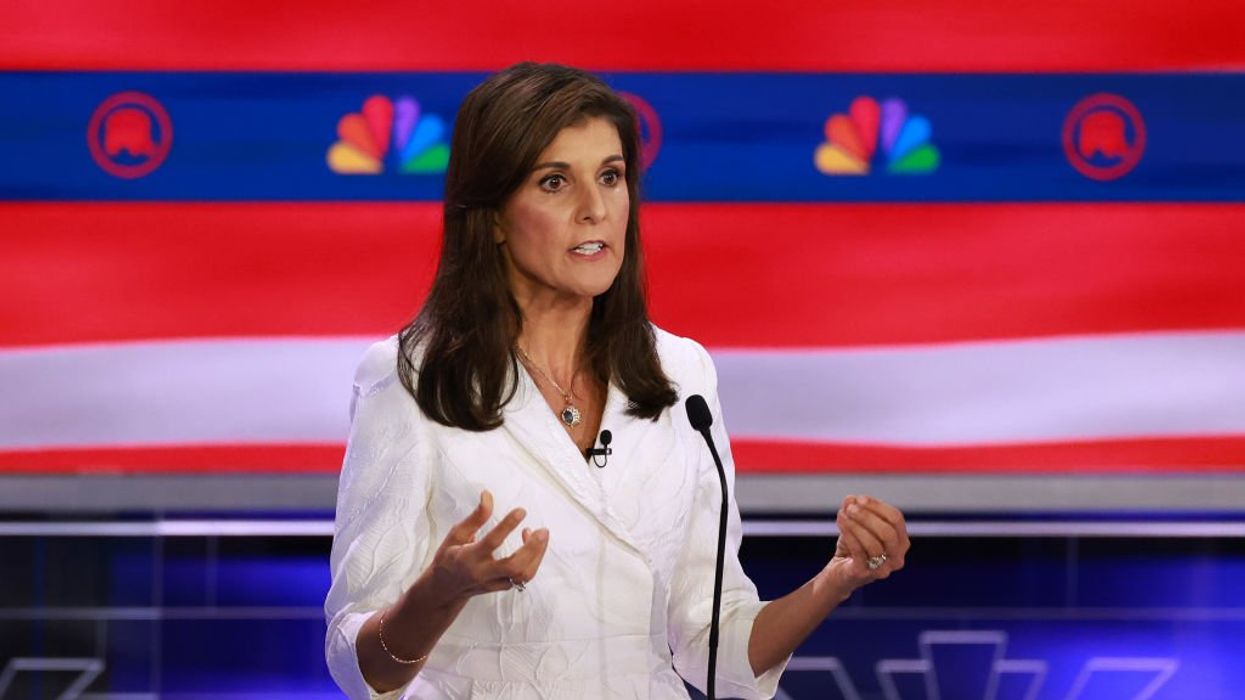
Joe Raedle/Getty Images

The moment the government and social media platforms coordinate on identity verification online, free speech in the 21st century will be effectively dead.
Social media is without a doubt less popular in the public imagination than it was when the global experiment began around 2004. While online forums and communities had existed before, the world would never be the same once Facebook, Reddit, Twitter, YouTube, and Myspace all emerged over roughly a three-year span. Initially revered as a democratizing force for free expression and liberal values, the social media industry enjoyed a honeymoon period that is decidedly over.
Presidential candidate Nikki Haley reminded us of this fact on Fox News Tuesday, when she ripped into anonymous online speech as the apparent cause of America’s uncivil politics. Haley proposed forcing social media companies to share their algorithms and require the verification of every user as a top priority of her future administration.
Understandably, many Americans are disenchanted with online life, but Haley’s remedy is a trap.
Online anons make life a little harder, for sure. Anonymous users come in droves, pollute comment sections, and tilt the balance of discourse in favor of those who hide behind what is essentially a modern pen name.
While those of us who travel online using our real names are bound by certain unspoken codes of conduct and concern with reputation, anonymous accounts with monikers like Comfortably Smug, the Critical Drinker, Shoe0nhead, Zerohedge, Doomcock, pakalupapitow, and pourmecoffee produce content and commentary with a little more flexibility. Some online denizens go to great lengths to remain anonymous; others operate barely in the shadows and can be found by any half-skilled sleuth. This is particularly pronounced within the cryptocurrency space.
The reasons for remaining anonymous can be malicious or driven by common sense. Rolling Stone reported on HBO executives who delegated the creation of anonymous accounts to attack TV critics. U.S. Senator Mike Lee (R-Utah) at first operated @BasedMikeLee on X (formerly Twitter) as almost a parody account while still revealing what he truly thought about issues of the day.
The fact is that anonymous publishing in America is as old as America itself. Benjamin Franklin wrote his pre-revolutionary pamphlets under the name Silence Dogood. “You know who were anonymous writers back in the day?” Florida Governor Ron DeSantis posted on X. “Alexander Hamilton, John Jay, and James Madison when they wrote the Federalist Papers. They were not ‘national security threats.’”
Like Nikki Haley, Canadian psychiatrist Jordan Peterson is not amused by online anons. But when he polled his audience on the proposition: “By failing to separate the anonymous cowardly troll demons from real people in the comments section @youtube and other SM (social media) platforms are enabling sadistic Machiavellian psychopaths and narcissists,” 60% of 158,596 respondents disagreed.
Would it have been more truthful and democratic if, to vote in Peterson’s poll, users had to first enter their names and home addresses into a government-mandated form? Taken to its logical conclusion, that’s what the Haleys of the world are arguing: Free speech demands public accountability. Those speaking without identifying themselves are troublemakers, social deviants, and, in Haley’s words, “a national security threat.”
Maybe forcing accountability would make public discourse more orderly and civil, but you’d certainly have less of it overall. Orderly societies are not necessarily free societies. China, for example, can credit the eerie silence in the public square to social pressure and the threat of government persecution if citizens say the wrong thing.
“Don’t allow the anonymous troll-demons to post with the real verified people,” Peterson tweeted at Elon Musk, “Put them in their own hell, along with others like them.”
It’s strange to see people like Peterson, who has experienced real-world censure and cancel culture firsthand, embrace content moderation solutions that their censors would love to see imposed in the name of “national security.”
Imagine how many more bank accounts Canada might have frozen during the 2022 trucker protests if the country had a Nikki Haley-style policy banning anonymous speech online. Solidarity with the truckers would have been far more perilous for everyday people.
Scoping out an online creator’s true identity tends to have one purpose, which is to shut them up. The Washington Post’s Taylor Lorenz clearly had such an aim in mind when she doxxed Libs of TikTok, as the account’s growing reach and influence became a concern to top Democrats and progressive activists.
For consumers and citizens online, there is another way that doesn’t involve the Department of Homeland Security under President Nikki Haley handing down rules of the road to Twitter executives. It’s called “discernment.”
For the online armies of anonymous goblins with zero to 100 followers, quite possibly under the dominion of Russian or Chinese troll farms, individuals and organizations must adopt a policy of courage and confidence. Treat accounts with goofy fake names and bald eagles for profile pictures with the dismissal they (largely) deserve. They exist to cast shadows of monsters on the wall, when in fact you’re dealing with trolls stacked inside a trench coat.
Second, punish platforms that don’t meet your standards for reducing engagement by bots by spending time online elsewhere. X has a lot of them these days, and it’s a problem. New platforms will step up with a better model for discourse. Be patient, and trust entrepreneurs to solve problems that consumers want solved.
Haley is not alone in being tired of bots and anonymous jerks showing their rears online, but the moment the government and social media platforms coordinate on identity verification online, free speech in the 21st century will be effectively dead.
Stephen Kent